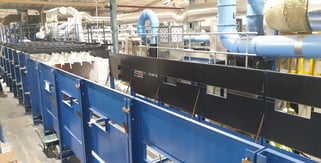Share this
What is Calcination
by Therser Sales Team on 09-May-2023 09:21:39
Calcination
It is used to bring about various chemical and physical changes in the material being processed.
During calcination, the substance is subjected to controlled heating, often in a furnace or kiln, to cause decomposition or removal of volatile components, such as water, carbon dioxide, and other gases. The high temperature alters the chemical and physical properties of the material, resulting in desired transformations.

Calcination serves several purposes depending on the specific application:
-
Removal of volatile components: Calcination can be employed to remove volatile impurities or substances bound within the material. For example, when heating limestone (calcium carbonate) during the calcination process, carbon dioxide is released, leaving behind quicklime (calcium oxide).
-
Thermal decomposition: Certain materials undergo thermal decomposition during calcination, resulting in the formation of new compounds or phase changes. This is commonly seen in the production of cement, where heating limestone and clay leads to the formation of calcium silicates.
-
Improved reactivity: Calcination can enhance the reactivity of materials by increasing their surface area or modifying their crystal structure. This is often employed in the preparation of catalysts, where calcination helps activate or stabilize the desired catalytic properties.
-
Drying and moisture removal: Calcination is frequently used to remove moisture from substances by subjecting them to high temperatures. This process is employed in various industries, such as the drying of clay for ceramic production.
The specific temperature and duration of the calcination process depend on the material being treated and the desired outcome. By controlling these parameters, manufacturers can achieve the desired chemical, physical, or structural changes in the material.
Please contact our sales team today on 44 (0)1782 824453 or drop us an email to sales@therseruk.com
Share this
- Company News (90)
- Battery Materials (41)
- kiln (37)
- fabrication (29)
- Alloy (27)
- Furnace (27)
- Welding (16)
- Industrial Kilns (15)
- Battery (13)
- Ceramic Kilns (13)
- Processes (13)
- alloy fabrication (13)
- Shuttle Kilns (12)
- RTO’s (11)
- Vacancies (11)
- Hydrogen (10)
- Therser UK (9)
- Tunnel Kiln (9)
- Refractory (8)
- Therser (8)
- Wellman Furnaces (8)
- Brickwork (7)
- Case Studies (7)
- Afterburners (6)
- Fibre Lining (6)
- electric (6)
- Almor Wellman (5)
- thermal engineers (5)
- Biochar (4)
- Exhibition (4)
- Pyrolysis (4)
- Servicing (4)
- Spares (4)
- heat treatment (4)
- History (3)
- Ceramics Uk (2)
- Combustion Control Upgrades (2)
- Nitrogen (2)
- Temperature Control Rings (2)
- gas (2)
- Certificates (1)
- Instrumentation (1)
- MMC (1)
- RHK (1)
- Roller Hearth Kiln (1)
- Test Trials (1)
- aerospace (1)
- analyser (1)
- elec (1)
- oxygen (1)
- vans (1)
- September 2025 (2)
- May 2025 (2)
- March 2025 (1)
- February 2025 (2)
- January 2025 (5)
- December 2024 (5)
- November 2024 (7)
- October 2024 (5)
- September 2024 (4)
- August 2024 (14)
- July 2024 (13)
- June 2024 (2)
- May 2024 (5)
- April 2024 (13)
- March 2024 (8)
- February 2024 (12)
- January 2024 (14)
- December 2023 (6)
- November 2023 (12)
- October 2023 (24)
- September 2023 (11)
- August 2023 (11)
- July 2023 (9)
- June 2023 (15)
- May 2023 (53)
- April 2023 (5)
- March 2023 (6)
- February 2023 (7)
- January 2023 (3)
- December 2022 (8)
- November 2022 (5)
- October 2022 (11)
- September 2022 (1)
- August 2022 (2)
- July 2022 (1)
- June 2022 (2)
- May 2022 (1)
- March 2022 (1)
- February 2022 (1)
- January 2022 (1)
- December 2021 (3)
- October 2021 (1)
- August 2021 (1)
- June 2021 (1)
- May 2021 (4)
- April 2021 (2)
- March 2021 (4)
- February 2021 (2)
- December 2020 (3)
- November 2020 (1)
- September 2020 (3)
- May 2020 (1)
- April 2020 (2)
- March 2020 (1)
- January 2020 (1)
- December 2019 (1)
- July 2019 (2)
- June 2019 (1)
- April 2019 (2)
- March 2019 (3)
- February 2019 (4)
- December 2018 (1)
- November 2018 (1)
- September 2018 (2)
- August 2018 (1)
- July 2018 (1)
- May 2018 (3)
- April 2018 (1)
- February 2018 (3)
- January 2018 (2)
- December 2017 (3)
- November 2017 (1)
- October 2017 (2)
- September 2017 (4)
- August 2017 (1)
- July 2017 (2)
- June 2017 (2)
- May 2017 (3)
- April 2017 (3)

